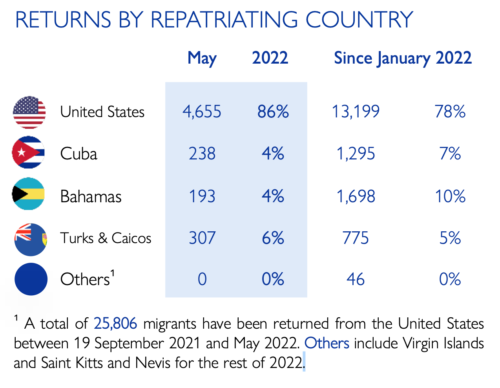[caption id="attachment_10425" align="alignright" width="500"] IOM Figures, end of May 2022 report. The figure of 25,806 returned from the United States includes Coast Guard repatriations - in addition to flights.[/caption]
IOM Figures, end of May 2022 report. The figure of 25,806 returned from the United States includes Coast Guard repatriations - in addition to flights.[/caption]
There has been a brief, no doubt temporary, respite from the expulsion of people back to Haiti under Title 42 this week. There was one removal flight to Haiti on Tuesday, which seems to have been “regular” deportations (people removed under normal immigration processing authority, or Title 8). The temporary reprieve is possibly due to the Summit of the Americas taking place in Los Angeles, where a new regional compact on migration is supposed to be announced. Certainly there has been no public commitment from the Biden administration to slow or halt expulsions to Haiti (you can sign our petition demanding a moratorium on removals to Haiti here). In May, the Biden administration expelled over 4,000 Haitians on 36 flights.
The flight this Tuesday (June 7) was the Biden administration's 268th expulsion flight to Haiti - 231 of which have taken place just since September 19, 2021 when the current wave of mass deportations began. Since September, over 24,000 Haitians have been expelled by air, including families . According to the International Organization on Migration's office in Haiti, 20% of those expelled from the United States have been children.
In addition to flights, however, there has been a dramatic increase in the number of Haitians interdicted at sea. The US Coast Guard has captured and returned 5,300 Haitians since the beginning of the current fiscal year (October 1, 2021). As the Miami Herald notes, the actual numbers of Haitians leaving by boat is unknown, as the voyages are often deadly. Many of the people leaving by boat are not trying to come to the United States, but more often to neighboring Caribbean islands. One result is that expulsions from those destinations have increased as well. Cuba, for example, has returned 1,300 Haitians so far this year, the Bahamas, 1,600.
At the US/Mexico border, confusion reigns. Title 42 is not ending soon. A federal court issued a temporary injunction against the Center for Disease Control and Prevention decision to end Title 42 two weeks ago. Title 42 will end eventually, of course, but it has become a political football, with state leaders using it to bludgeon Biden in courts, and Senate Republicans and some Democrats trying to force a vote on it as a precondition for passing COVID relief (though this strategy may now be on hold). The context here is the midterm elections, which also corresponds with gubernatorial races in many states - including Texas and Arizona.
New asylum processing rules were implemented by the Biden administration this week expanding the use of expedited removal. The new procedures are intended to speed up the process of making asylum decisions. There is deep concern that in doing so, the new rules will limit the ability of people to find representation and build their asylum cases. This means fewer approvals alongside an abbreviated appeals process. More than anything, however, the transition from Trump to Biden continues to be marred by mass confusion about what the rules actually are at the border.
People from Haiti, and many other countries, are currently waiting in Tijuana, Nuevo Laredo, Juarez and other border cities confused about when or if to come into the United States. This week the dangers of this were magnified by the murder of a Haitian migrant in Tijuana and the death of another man who was unable to get medical treatment as he was having a heart attack.
Finally, as noted above, the Summit of the Americas is happening this week and there is to be a much anticipated announcement concerning new commitments toward collaboration on regional migration. The two pillars of this agreement seem to be 1.) searching for temporary working opportunities for migrants, and 2.) expanding enforcement throughout the region. As I am writing, the migration declaration has not been finalized, but is expected to include provisions to expand temporary work programs for Haitians in Canada.

